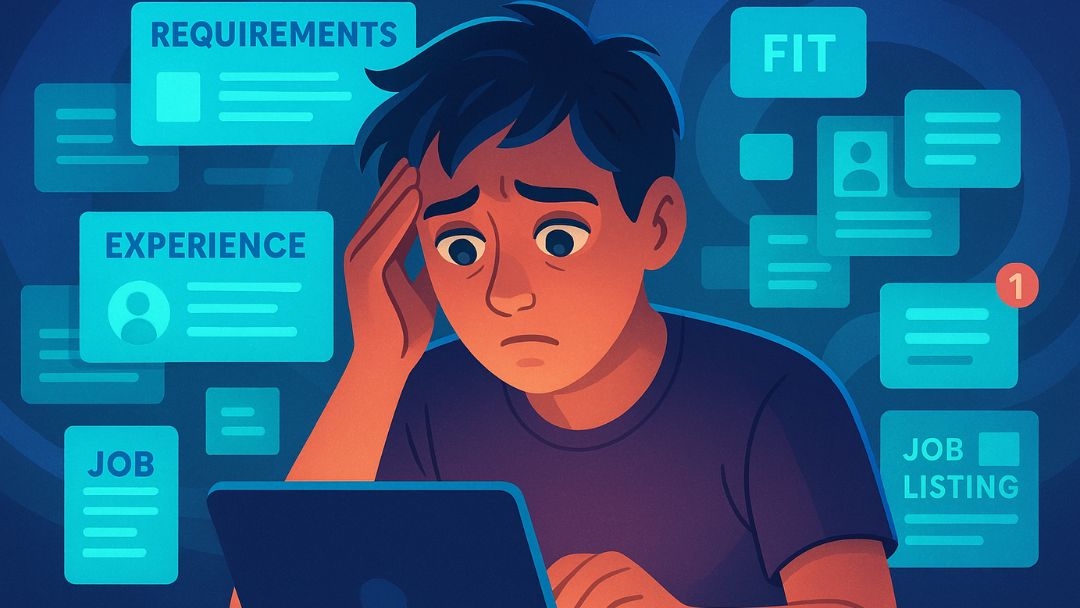Why Can’t I Get a Job? 10 Reasons You Keep Getting Rejected and How to Turn Things Around
Landing a job isn’t as straightforward as it used to be. With growing competition and changing hiring trends, qualifications alone aren’t always enough. But every rejection can be a step forward if you know what to learn from it. Here are ten common reasons you might not be getting hired, and how to bounce back stronger.


Back
6 mins read
I’ve had my fair share of rejections while job hunting. Most of us have. But what I find most frustrating isn’t the rejection itself; it’s not knowing why. Often, all we receive is an automated email politely stating that our application was unsuccessful, without any indication of what went wrong or how to improve next time.
So we’re left guessing: was it my resume, my interview, or was the competition just too strong?
Maybe you’ve also found yourself asking, “Why can’t I get a job?” after one too many rejections. You’ve probably spent hours reworking your application, wondering what you’re still missing. It’s time to change that.
We’ve put together ten reasons qualified candidates don’t get hired and what you can do to turn things around.
10 Reasons You Can’t Get a Job and How to Fix Them

Job hunting can be depressing, especially when it feels like you’re doing everything right and still getting nowhere. Sometimes, the problem isn’t even you. Factors such as high competition, age bias, economic downturn, or AI adoption can all play a role.
Fortunately, in many cases, you actually can improve your chances. Small changes in how you apply and present yourself can make a big difference. Let’s explore why people struggle to get hired, and the practical steps you can take to finally get noticed.
1. Your Resume Isn’t Optimized for the ATS
When your resume isn’t formatted for the ATS, it might not appear when recruiters search for qualified candidates in their database.
Companies use an Applicant Tracking System (ATS) to organize resumes and surface candidates with the right skills. Research finds that nearly all Fortune 500 firms use an ATS and that recruiters commonly search by keywords, so if your resume isn’t optimized, it may not show up in those searches.
Solution: Optimize Your Resume for the ATS
Naturally include key phrases from the job description, but avoid keyword stuffing. Keep your layout simple by avoiding graphics, fancy columns, and tables. A clean format with standard fonts and clear headings works best.
2. Your Application Isn’t Catching the Recruiter’s Attention
If your resume and cover letter feel bland, it won’t grab anyone’s attention even if you have the right experience.
Recruiters want to see why you’re the right fit for their specific role, but they often spend less than 9 seconds scanning each resume. If your resume doesn’t feel right immediately, you may struggle to get a deeper look.
Solution: Make Your Application Stand Out
Don’t just list tasks you’ve done; explain how those tasks connect to what they need. Highlight your most relevant experiences and skills that directly match what the company is asking for.
3. You’re Prioritizing Quantity Over Quality
Sending dozens of applications might feel productive, but it often means none of them get the attention they deserve.
I’ve been guilty of applying to several jobs in one sitting just to feel like I’m making progress. However, my applications usually end up looking generic. Recruiters can often tell when you haven’t taken the time to tailor your resume to the job.
Solution: Focus on Quality Applications
Apply only for roles that fit your personality, skills, goals, and career interests. Read each job posting carefully and tweak your resume and cover letter to match.
4. You’re Not Tapping into Your Network
The right connection can open doors that hundreds of online applications never will.
Many positions are filled through referrals or internal recommendations long before they’re advertised. When someone in your network refers you, your application avoids the pile and lands directly in front of a hiring manager with a built-in vote of confidence.
Solution: Start Networking Authentically
Reach out to former colleagues, classmates, or mentors. Let them know you’re exploring new opportunities. Instead of saying, “I’m looking for a job,” try “I’m exploring marketing roles in tech. Do you know anyone hiring or open to chatting?” You’d be surprised how many are willing to help. Build your online relationships by engaging with posts and joining conversations on LinkedIn or professional forums.

5. You’re Limiting Your Options Too Narrowly
When you only apply to roles that fit you perfectly, you might miss out on opportunities that align with your skills in unexpected ways.
Sometimes we get so fixated on landing one specific job title or company that we overlook great opportunities elsewhere. You might be qualified for related roles that use the same skills but go by different names or exist in industries or locations you haven’t considered.
Solution: Broaden Your Search Smartly
Look beyond job titles and search using skills and responsibilities. Explore related industries where you can easily utilize your transferable skills. Don’t be too rigid about location or position. Stay open to entry-level or contract roles with growth potential.
6. You’re Not Showing Genuine Interest in the Role
When your application lacks energy and genuine passion for the role, you lose the chance to stand out from your competition.
Recruiters notice when you sound disengaged in your emails, interviews, or cover letters. If you don’t show curiosity about the company’s work or enthusiasm for the role, it’s easy to assume you’re not that invested.
Solution: Engage Beyond the Application
Research what the company does, who their clients are, and what makes them different. Let your passion show when you talk about how the role fits your goals in your cover letter and during the interview. You may also follow up thoughtfully after the interview to reinforce your interest.
7. You’re Applying for Jobs You’re Underqualified For
When you aim for roles far beyond your current skill set, recruiters may see potential but not enough readiness to justify the hire.
Many of us love to aim high, and there’s nothing wrong with ambition. But when you apply for roles that require experience or skills you don’t yet have, your application often doesn’t make it past the first review. Recruiters can spot when someone is stretching too far and usually prioritize candidates who already meet most of the requirements.
Solution: Apply Smart and Build Strategically
Focus on roles that align with 70–80% of your current skills and experience. Highlight transferable skills that show growth potential, especially if you’re switching industries. If your dream job feels out of reach, start by gaining the experience or certifications it requires.
8. You’re Applying for Jobs You’re Overqualified For
When your experience far exceeds what a role requires, employers may worry you’ll get bored or leave too soon.
It’s tempting to apply for easier roles when job hunting feels slow, but being overqualified can raise red flags. Recruiters might assume you’ll demand higher pay, struggle to take direction from supervisors, or view the job as a temporary stopgap. Even if that’s not true, it can make them hesitant to move you forward.
Solution: Reframe Your Application
If you’re applying for a role below your experience level, address it directly in your cover letter. Explain why you’re interested; maybe you’re changing industries, seeking better work-life balance, or wanting to refocus your career. Show genuine enthusiasm and make it clear you see the position as a fit, not a fallback.
9. Your Interview Skills Are Letting You Down
Failing to communicate your value clearly in an interview can make employers lean toward candidates who project more confidence.
I used to think the hardest part of job hunting was just landing an interview, and that once you got one, it was smooth sailing from there. But I’ve learned there are countless ways things can go wrong if you’re not prepared. At this stage, you’re often up against equally qualified candidates, so you need to bring your A-game to stand out.
Solution: Practice and Prepare
Research common interview questions and rehearse your answers out loud. Focus on storytelling by using real examples that show your results and personality. Ask a friend or mentor to do a mock interview with you, and always review your performance afterward to identify areas for improvement next time.
10. Your Soft Skills Aren’t Where They Need to Be
Even with strong technical skills and a perfect resume, weak interpersonal or emotional skills can cost you the job.
Employers aren’t just looking for someone who can do the work — they’re looking for someone who can work well with others, adapt to challenges, and stay composed under pressure. That’s why many interview questions are designed to gauge emotional intelligence (EQ), teamwork, leadership, and communication. If you struggle to express empathy, handle feedback, or navigate difficult conversations, recruiters may see it as a red flag, even if your resume shines.
Solution: Strengthen Your Soft Skills
Take time to build self-awareness, empathy, and emotional regulation — the core of strong EQ. You can start by taking an EQ assessment to identify areas for improvement, then practice active listening, clear communication, and managing stress in real-world situations. The more emotionally intelligent you become, the more confidence, composure, and connection you’ll bring to every professional interaction.
Keep Going. You’re Closer Than You Think

The last time I went through a long, uncertain job hunt, it was one of the scariest experiences of my life. But it also taught me a lot. I realized that while there’s so much we can’t control, there’s also so much we can do better. And every progress matters along the way to success as long as we don’t give up.
Keep refining your approach, keep showing up, and don’t let frustration steal your optimism. The right opportunity will come, and when it does, you’ll look back and realize every no was preparing you for that yes.
Until then, hold on to a positive attitude, speak affirmations that strengthen you, and trust that things are slowly but surely falling into place.


Return to Blog







